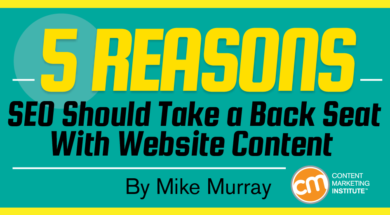Businesses should write about emerging trends to underscore their expertise and vision and SEO may not be top of mind when shaping the content. Few people search for the keyword phrase Many low-volume search terms involve long-tail keyword phrases. But, typically, your site ranks on the first page of Google for keywords searched 300 to 500 times a month. Your website content should engage and satisfy people when they arrive through: Website navigation that highlights the content Shared links Who cares about keywords for which you can’t rank well or phrases that people hardly use if most of your site traffic doesn’t come from search (and you’re OK with that)? Imagine the power AT&T has to market its content, including this business article: 4 Ways to Delight Your Smartphone-Happy Customers. 1 on Google for “delight smartphone customers,” but that keyword phrase isn’t searched frequently. No, it’s not an SEO priority (it shows no real effort to rank for “grain bin safety,” which averages at least 90 monthly searches on Google). That way they can target new keyword phrases with their new content. Weigh SEO with other content goals and your ability to attract the relevant visitors from multiple sources. It’s always good to be mindful of #SEO, but you’ll need to decide when to make time for it.

It makes sense at times to produce content without worrying too much about the SEO aspects. (Please know it isn’t easy for me, an SEO professional, to write that.)
Some SEO purists suggest that website content be optimized at all times. It’s inevitable that someone – or a team – will follow an internal process and think about the content with an everything-SEO mentality.
But there are situations when you don’t need to sweat SEO – or can at least scale back the effort. Here are five occasions to consider.
1. You’re writing about a new trend
B2B and B2C brands sometimes want to be out front with a new industry phrase – long before it’s widely used. The phrase may not even have any or much detectable search volume.
Businesses should write about emerging trends to underscore their expertise and vision and SEO may not be top of mind when shaping the content. You’ll be rewarded later on search engines for having a content-first approach. As your article ages and attracts inbound links and interest, you’ll be in a good position to rank well as the keyword phrase gains momentum.
At some point, for example, someone wrote about “influencer marketing.” The Google Trends index shows how the phrase grew in popularity over three years.

2. Few people search for the keyword phrase
Many low-volume search terms involve long-tail keyword phrases. It’s still useful to target them if they have the potential to generate high rankings and leads, particularly for B2B companies with long sales cycles. But these low-volume search phrases are not always relevant or likely to convert.
3. The desired keywords are too competitive
You may want to rank on the first page for “CRM tool,” which is searched an estimated 2,900 times a month, according to Google. But, typically, your site ranks on the first page of Google for keywords searched 300 to 500 times a month. Are you really going to build your SEO page strategy around the popular phrase “CRM tool”?
If a keyword phrase is beyond your reach, accept your competitive position and weigh alternative keyword phrases. Here are some questions to consider when selecting a different phrase:
- Will the keyword phrase work in the…

COMMENTS